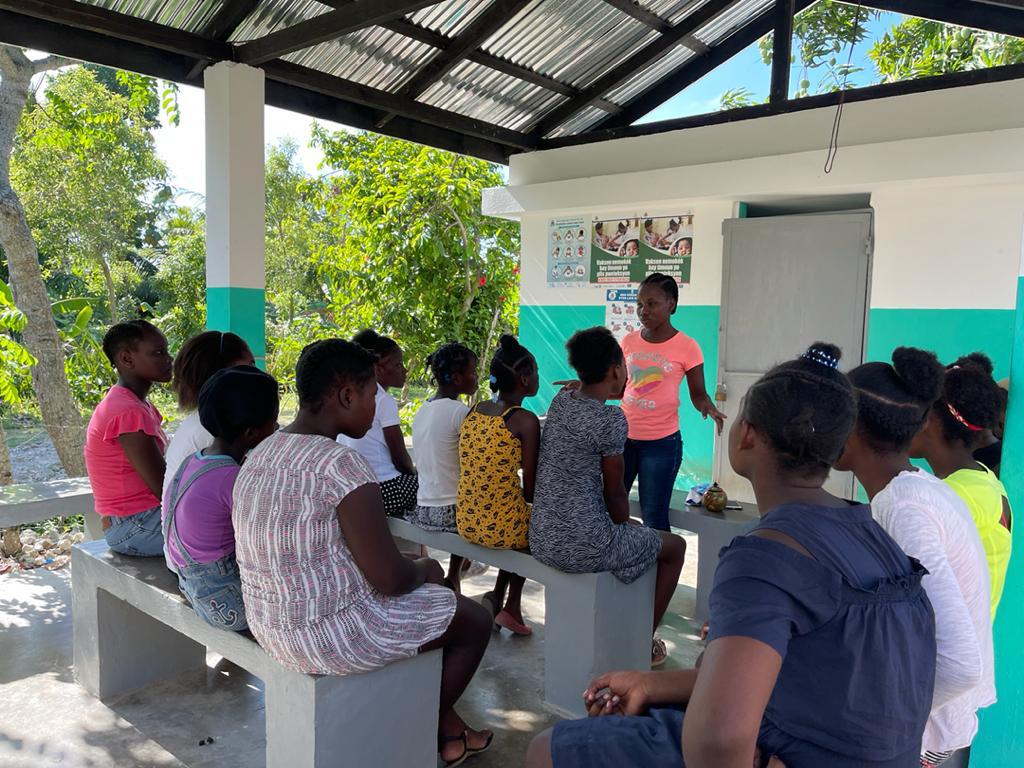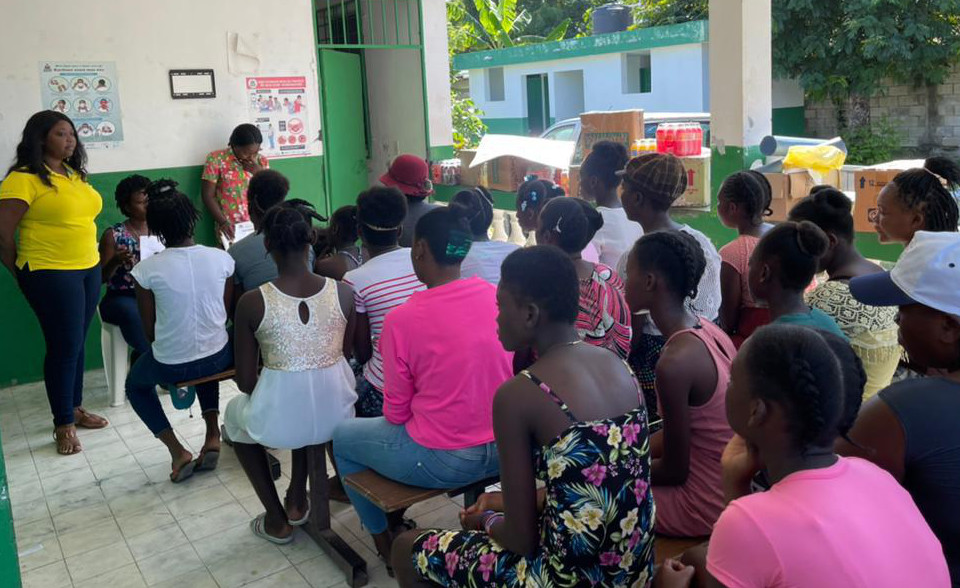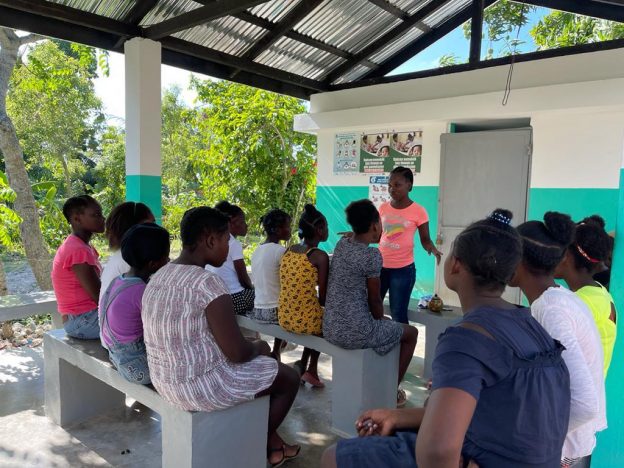
Comprehensive SRH education program in Haiti addresses gender inequality
Care 2 Communities (C2C)’s Managing Director Racha Yehia sat down with Development Coordinator Amanda Fata to discuss the the development of C2C’s new and comprehensive sexual and reproductive health education program that is tailored to its community context in Haiti. This interview highlights why and how C2C developed the program, and how it contributes to C2C’s vision.
“Girls in Haiti, like in many places around the world, are not empowered to make decisions about their sexual health or take ownership of their own bodies. I believe this systemic gender inequity has led to many issues in the country.” – Racha Yehia
Amanda Fata, interviewer: What does C2C do and what is your role with the organization?
Racha Yehia: Care 2 Communities (C2C) is a nonprofit organization that operates a network of primary care clinics in northern Haiti. C2C is different from traditional aid models for two main reasons:
- We have a public-private partnership with Haiti’s government—rather than building new clinics, we work with the Ministry of Health to rehabilitate existing public clinics. This approach improves the quality of primary care services offered and increases access to care for poor and low-income people, empowering families to lead healthier lives.
- We have a social enterprise community-based healthcare model that delivers results for under-resourced communities. We provide high-quality, affordable, patient-centered care through seven clinics that operate as social businesses. Over time, they begin to financially sustain themselves, ensuring that people get the health care they need today and in perpetuity.
I started at C2C in 2017 as the Clinic Operations Coordinator and was promoted to Director of Operations in 2018. This past year, I was chosen to lead C2C directly from the ground here in Haiti as Managing Director. I have been living and working in Haiti for more than six years. I came here to work on strengthening the health system and decided to make Haiti my home. My husband is from Haiti and we have a little girl who we are raising here. I have a strong attachment to Haiti when it comes to my personal and professional life.

Why did C2C choose to design its own comprehensive sexual and reproductive health education course? Why now?
Girls in Haiti, like in many places around the world, are not empowered to make decisions about their sexual health or take ownership of their own bodies. I believe this systemic gender inequity has led to many issues in the country. It’s well known that early unwanted pregnancy is linked to poverty. At C2C, 15% of the patients in our maternal health program are under 18. I see girls coming in for prenatal visits who are 18 or 19 and in their fourth pregnancies, with children from different partners. Not only do these girls not finish their education, they cannot provide for their families. We also see this through our child malnutrition program, where the same girls often return with their children who are suffering medically because they are underweight and not getting the appropriate nutrition. We help them by giving them a nutritional supplement for the child and take the opportunity to educate the mother on healthy and nutritious foods. We offer these services to treat these issues, but our overarching goal is to address the root causes of these issues. Comprehensive sexual and reproductive health education seemed like the natural and best place to start.
“We offer these services to treat these issues, but our overarching goal is to address the root causes of these issues. Comprehensive sexual and reproductive health education seemed like the natural and best place to start.”
We chose to design our own curriculum, working with a Haitian-American psychologist with years of experience in Haiti, because we wanted to make the course fit the context in which we are working. There are many myths and misconceptions that are prevalent in Haiti when it comes to sex—for example, if you have sex in the ocean, you cannot get pregnant; if you drink a beer after sex, you won’t get pregnant; if you have sex with a person with a disability, you will get rich. These myths are harmful and promote risky sexual behavior that harm girls and others.
We also felt that it was important to engage the girls in a way that gets them interested and excited about this information, so that they can take their knowledge and apply it to their lives and share with others as well. There is a section of the course that talks about Rabòday, a popular genre of music in Haiti with lyrics that are very degrading towards women. In this section, we look at some of the lyrics and discuss common themes, how men and women are described in the songs, what stereotypes this genre conveys, and the type of dangers it perpetuates. I hope by learning about how sexism plays into every facet of their lives, they will become more aware of it and work to change it, starting with their own lives and the choices they make.
How did you create the course? What were the steps from when you had the idea to the implementation of the course?
We have been wanting to start this project for several years, so we had quite some time to think about what the course would look like and what our goals would be. In 2020, we were fortunate enough to get funding from Together Women Rise (formerly known as Dining for Women) and the Conservation, Food and Health Foundation to make it a reality. Before moving any further, we surveyed community members, including parents, to get their thoughts about the course and address their concerns. We were happy to find that everyone was accepting and supportive of the project.
We really wanted to create our own curriculum tailored specifically to the girls in our communities, the barriers they face to reproductive health, and their interests. We circulated a job posting for a curriculum writer and were fortunate enough to work with Dr. Elizabeth Louis. We had such a great experience with Dr. Louis that we asked her to join our Board of Directors. We also hired a nurse and social worker to teach the course, since we thought it was important to have young female professionals teach as a team to make the young women feel comfortable with the material and to address any and all questions that the students might have.
“We really wanted to create our own curriculum tailored specifically to the girls in our communities, the barriers they face to reproductive health, and their interests.”
We then spread the word about the program in and around our clinics and through our community health workers. Once all of the participant spots were filled, we held an education session for the parents of the girls so that they could learn more about the curriculum to ask questions and raise concerns. After that, it was time to launch the course.
Q: What was the response from the community? Are there elements of the course that address community-specific challenges?
Before we start any new program, we take the idea to the community first. For this course, we did a feasibility study and interviewed many community leaders—government officials, pastors, teachers, parents, and our own staff. The responses were overwhelmingly positive, even from the church, which is very influential in Haiti. While many may hold traditional values, they see the negative consequences that the lack of sexual education has on the women in their lives. They were eager to have us begin the program. Many of the people we talked to wanted to educate their children on these subjects, but they didn’t know how and many did not have that knowledge themselves.
“While many may hold traditional values, they see the negative consequences that the lack of comprehensive sexual education has on the women in their lives … Many of the people we talked to wanted to educate their children on these subjects, but they didn’t know how and many did not have that knowledge themselves.”
Q: What do you ultimately hope to achieve with this course? What is your vision?
I have big plans for this course. We are currently in our pilot phase: a cohort of 20 girls ages 13-18 enrolled in a 20-week course at six of our clinic sites. Once this course is complete, we will repeat it again for another group of girls. Next year, we will adapt the curriculum for boys. We will still run the two sessions of the class for girls, but we will do a separate one for boys as well. We know that it is critical to include boys in these conversations to help shape their knowledge and behaviors which have a direct impact on their health, their partner’s health, as well their families. The girls’ class and boys’ class will still be separate, so that everyone feels more comfortable asking questions. For year three, we will separate the classes further by age—one class for girls ages 10-14 and another for girls 15-18, and the same for boys. In the fourth year, I want to pilot the course at a local high school to see if we can integrate it as part of a school curriculum, which is unheard of in Haiti. Once we have several years of data, we will pitch the course to the Ministry of Education and my hope is that one day the course is taught in schools throughout Haiti.
Read the full interview on Knowledge Success.
